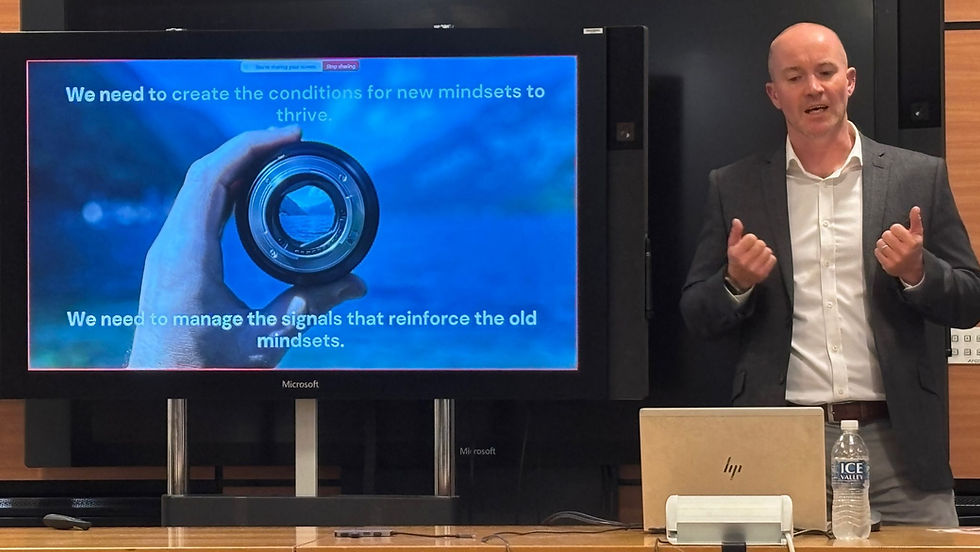Culture is what you allow: are you tolerating the wrong behaviours?
- Jul 15, 2025
- 4 min read
Updated: Aug 5, 2025
Your culture isn’t what you tell people it is, just because you say so. It’s not the words on your careers page or the slogans on your office walls. It’s not the values you espouse that adorn the walls of your meeting rooms or the “employee experience” presentation at your last business update.
Those may help communicate your intent, or what you’d like to build, but they don’t define your culture.
Culture is what actually happens. It’s the patterns of behaviour that are encouraged, discouraged, or tolerated within your organisation, by your leaders, by you, over time. And toleration is the silent assassin that can do a huge amount of damage, usually contradicting the culture you set out to create.
In our work with CEOs and HRDs, we often challenge a popular but unhelpful phrase that circulates in executive teams:
“Culture is the way things are done around here.”
It sounds accurate, but it has a passive quality, as though culture is some kind of invisible fog we all operate in that just happens. By having this mindset, leaders and HR teams often feel powerless in the face of some of the aspects of their culture that they’d rather not have.
However, culture is something that can be understood, influenced, and changed. It isn’t abstract. It’s largely behavioural. And because it’s behavioural, it’s manageable.
How to manage your culture
We work with a much sharper definition of culture that can change a leadership team’s whole mindset around managing it…
Culture is the pattern of behaviours that are encouraged, discouraged , or tolerated by people and systems over time.
While what you encourage and discourage are just as important to investigate when looking into managing your culture, diving into what your people and systems tolerate is key to embedding the correct culture across an organisation.
Because when we ignore behaviours that contradict the culture that we say we want, we’re not staying neutral – even if we might like to think that we are. We’re actually endorsing them. We’re becoming complicit.
Every time poor performance goes unchallenged, every time toxic behaviour is overlooked because “he’s good with clients,” every time someone behaves in ways that contradict your stated values and no one calls it out, you’re reinforcing a pattern. And over time, you can be quite sure that pattern will go on to be “just the way we do things around here.”
The good news is that this isn’t a theory. It’s real, tangible, and measurable.
The impact of tolerating misaligned performance and behaviours
In our 2017 study of senior leaders across multiple industries, 21% said that poor performance is not addressed in a timely or appropriate way. The real figure may well be higher – not everyone would like to admit that they turn a blind eye to it. The implications for those organisations could be profound.

People notice. Employees are acutely tuned in to what leaders let slide. When subpar performance, damaging behaviours or passive-aggressive politics are tolerated, the message is clear: this is acceptable here. Some disengage. Others adapt. A few might leave. But most will adjust to fit the environment you’ve (unintentionally) permitted.
Except, perhaps for your talent. People who want to perform, who want to get results, who want to really go somewhere, pay attention. They realise when they’re picking up the slack, and they don’t usually like it. So before long, they go somewhere where they can challenge and be challenged, where people across the board are pushing each other to raise the bar for performance. And the place they left will be all the poorer for it, gradually sliding to the level of performance that people feel inclined to give.
This is where the cost shows up:
In slower decision-making and diluted accountability.
In missed opportunities because people don’t trust each other enough to speak up.
In strategy decks that gather dust because the leadership culture doesn’t support execution.
In the hidden energy drain of working around people who don’t pull their weight or don’t treat others with respect.
The irony is that often, the people doing the most damage are seen as “too senior to address.” In reality, they’re the signal everyone else is watching. If their behaviour is tolerated, it sets the tone for the rest of the organisation.
So, what can you do?
Three ways to stop tolerating the wrong things
1. Define what ‘good’ looks like
Be explicit about the behaviours you expect, not just what you don’t want. Tie them to your strategy, not just your values. Ask: What ways of working are non-negotiable if we’re going to deliver on our ambitions? These need to be specific. It has to be easy for a person to understand what ‘doing the behaviour’ or ‘not doing the behaviour’ looks like in practice, in their job.
2. Make consequences real
Accountability isn’t about being punitive, it’s about clarity and expectations. When someone behaves in a way that undermines trust, alignment or delivery, there must be a response. Silence is a decision. If someone repeatedly steps outside the boundaries and nothing changes, part of the problem sits with them – the rest with those who are in a position to hold them to account and are failing to do so.
3. Support your leaders to act
Many leaders avoid difficult conversations out of discomfort or fear. They need the skills and support to intervene early, before behaviours calcify into culture. But this also requires a mindset shift to something more fitting for an organisation that wants to build a culture with intention…
“They’re under a lot of pressure.”
“They’ll react badly.”
“They’ll figure it out eventually.”
Until these mindsets are replaced with more effective ones, the behaviour will not change.
Examples of more effective mindsets could be...
“They’re under a lot of pressure, which is exactly why they need support and clarity.”
“They may react badly, but that isn’t my responsibility. Clarity is.”
Start making changes today
If you're serious about building a culture that delivers on strategy, start with what you're tolerating, because the behaviours you ignore are just as powerful as the ones you reward.
In a world where talent, trust, and time are your most limited assets, you can’t afford to look the other way.
At Culture Impact, we’ve helped over 40 organisations transform their culture, and investigating what leaders and systems were tolerating was key to every success. Reach out to our team for a quick chat about your challenges if you’d like to explore more strategies to ensure your culture is aligned with the direction of your business.




Comments